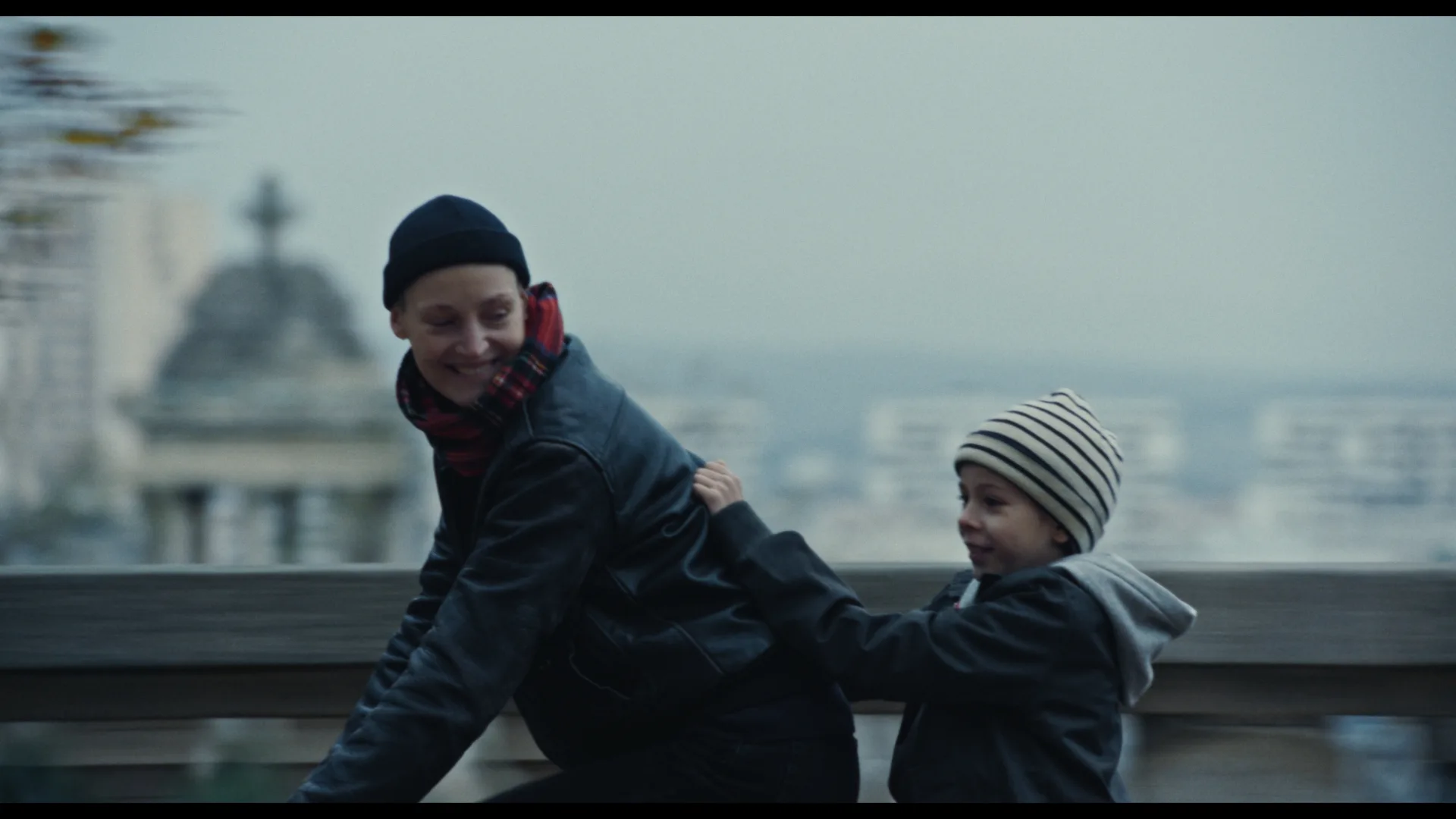Writing about this assortment of films reminded me of two tried and true realities of film festing: no amount of pre-festival hype can compensate for the film itself (case in point: as high as I am on Julia Ducournau’s “Alpha,” it pains me to see it receive a muted response) and there will always be at least one or two films I’ll go into knowing nothing about and will walk away with it being one of favorite films of the year. Both things happened with this trio, and in that sense, Cannes has kept me on my toes as I’ve discovered new classics as frequently as I’ve been disenchanted. “Splitsville,” “Love Me Tender,” and “Nino” span the gamut and reaffirm the adrenaline rush that comes with seeking the next thrill or facing the next disappointment.
Director Michael Angelo Covino’s “Splitsville” is the type of indie comedy with A-list talent and a beguiling premise (two couples who explore open marriages) that seemed poised to fill the void of studio comedies that skewer contemporary relationship angsts with introspective badinage. Regrettably, it only widens the vacuum, refusing to let moments of sentiment or comedy land before pulverizing you with another joke, each unfunnier than the last. Despite a couple of standout sequences (there’s a random action beat that occurs early on that I’d shortlist for the newly minted Best Stunt Design Oscar expeditiously if I could), a comical turn from a bumbling Nicholas Braun, and Adam Newport-Berra’s playful cinematography, it gets in its own way far too much, a symptom of Covino and co-writer Kyle Marvin–who both star in the film–injecting too much of their own sensibilities to make this vain project work on any level beyond their wavelength.
Like getting catfished on a dating app, “Splitsville” starts with intrigue before declining into something more childish. The film opens on couple Carey (Marvin) and Ashley (Adria Arjona, sharpening the comedic chops she embodied with such verve on “Hit Man” into something touchingly zany here) en route to a lake house owned by their friends Paul (Covino) and Julia (Dakota Johnson). A car crash interrupts their journey, and as Ashley fails to resuscitate one of the victims, she gains a certain clarity about her life that only proximity to death can provide. She swiftly tells Carey she wants a divorce (they’ve only been married for about thirteen months) and crestfallen, Carey leaves the scene and swims to Paul and Julia’s house. Sullen, Carey explains the situation to them, hoping to find comfort, only to receive provocative advice instead: Paul and Julie have an open marriage. The duo reasons that removing the stigma, guilt, and shame around affairs, leads to a stronger and healthier union between them. The soft-spoken Carey decides to bring this practice back to his and Ashley’s home, although things worsen when he and Julia sleep together, conjuring feelings of jealousy within Paul.
I’m all for actors-turned-directors to use their projects as a way to probe through their own insecurities and queries (see “The Chronology of Water” and “Urchin”) but the problem with “Splitsville” is that there isn’t enough artifice between the story on-screen and Covino’s and Marvin’s own provocations to make it feel like we’re watching anything other than two guys’ half-formed and undercooked thoughts on the absurdity of open marriages. The amount of dialogue that revolves around the size of Michael’s and/or Kyle’s penis is another fixture that screams vanity. It’s telling where the priorities lie when Carey’s dick–which we see more than once–is given a character arc, which is more than one could say for Arjona’s woefully underwritten Ashley.
“Splitsville” also commits the grave sin of gesturing at something funny and coaxing laughs from its cognizance rather than dissecting why the machinations themselves are humorous. This comes up in one sequence where a few years into Carey and Ashley’s opening of their marriage, their home has become an Airbnb for Ashley’s lovers, who all await her beck and call. A more thoughtful script might have used this set-up to poke fun at how the logistics of affairs can be messy (the Google calendar must be a nightmare) and how Carey and Ashely’s wealth enables them to live such a transgressive lifestyle, but the film seems content with naming the set-up as absurd and moving on. The dialogue is a greater symptom of this lunacy, as it feels like the script can’t trust itself to hold attention to a serious moment before undercutting itself with a joke. In a heated exchange between Paul and Julie where the two are discussing how they’ll care for their son, Russ (Simon Webster), while navigating their open marriage, Paul tells Julie “I’ve been reading about child-centered divorce,” to which she immediately quips “You’ve been reading?”; the first time is funny, but by the time instance seventeen rolls around, it becomes grating.
Newport-Berra’s cinematography as well as Sara Shaw’s editing are the saving graces in this film. Newport-Berra’s skill shines in the film’s quieter, conversational moments between the film’s four leads, as his framing of the coterie never once feels the same. Even when characters are in the same space, he often portrays some of them as being in and out of frame, to show the discordance that exists amongst people who may think they’re on the same page. Shaw’s editing talents are on full display when Paul and Carey come to blows after Paul learns that Carey slept with his wife. The two tear up the lake house in their scuffle, throwing not just the kitchen sink but the kitchen table at each other, and Shaw lenses their battle as if it’s an action movie unto itself.

Per its gentle command, director Anna Cazenave Cambet’s “Love Me Tender” invites viewers to approach its story with a measure of grace and compassion, which is made easier thanks to the consistently stellar Vicky Krieps in the lead role as a woman fighting for custody for her child from a vengeful ex. Cambet has a lot of interesting and thorny ideas to explore around society’s oppressive expectations around what it means to be a “good mother” and how our justice system is willing to write off bad behavior in men as “complex” and bad behavior for women as deranged. The first few times that she talks about those ideas are interesting but at over two hours, the runtime doesn’t justify the ways Cambet circles around the same repeated themes.
Adapted from lawyer-turned-author Constance Debré’s 2020 novel, Krieps plays Clémence, a woman who has been amicably separated from her longtime husband, Laurent (Antoine Reinartz) for several years. At present there’s no tension between them, with the two even meeting up for coffee frequently as they discuss the best ways to care for their 8-year-old son, Paul (Viggo Ferreira-Redier) despite the different lives they lead. Things curdle to the bellicose when Clémence shares that she’s started to date women. His masculinity is bruised, Laurent cuts off communication with her and battles to get full custody of Paul out of spite. What follows is Clémence’s attempts to retain the privilege of seeing her son, while moving forward in her own exploration of her sexuality.
Clémence wrestles with whether or not the promise of a new, liberated life has to be contingent on the destruction of her old one, and the film is at its most resonant when we see her try to make peace with the parts of her society deemed irreconcilable. It’s evident that she does care about Paul even if it would be easier to treat their relationship as a casualty of the pursuit of her newfound desires, and Krieps captures tortured interiority so delicately. There’s a standout moment when Clémence is finally able to meet with Paul after a long hiatus, although this can only be done in the presence of court-appointed social workers. As the two embrace, it’s hard not to feel secondhand embarrassment as cinematographer Kristy Baboul’s initial framing captures the social worker’s presence in the shot; it’s an intimate moment that should be kept private between mother and child, and yet our viewing intrudes. Baboul’s camera moves closer to Clémence and Paul, till we’re lost in their embrace, our gaze lost in Clémence’s hand, who strokes the tufts of Paul’s hair. It’s one of those achingly potent moments that Cambet’s film makes Clémence’s pain and longing our own.
Yet, across the whole film, Cambet’s film falters in conjuring that same intimate envelopment the way she’s able to do in those aforementioned scenes. Legal battles like the one Clémence endures are arduous, soul-sucking, and frustrating, and while on level, I could see Cambet’s revisiting of these moments as a way to situate viewers into Clémence’s headspace, it doesn’t make it any more pleasant to endure.

Softly devastating while being defiantly celebratory, director Jocques Loquès’ “Nino” feels like a minor miracle in the way it conjures up a well of emotions while never once feeling maudlin or pompous. It reminded me of John Michael McDonagh’s “Calvary,” in which both films chronicle their main character’s initial moments of processing after they receive life-threatening information. Both are films where their protagonists go about their last rites, but the films are less about the “how” of getting affairs in order, and more about the everyday grace of mundanity, how communities can gift us the words to not only hold our sorrow, but offer language to articulate the agonies we feel we can’t express. “Nino” feels like that warm embrace you receive from a friend or the kind look you get from a stranger that makes our everyday hells bearable for just a moment.
Théodore Pellerin stars as Nino, a twenty-something who lives in modern-day Paris. He goes for a check-up on his throat that’s been causing him pain, only to learn that he has throat cancer. He’s told that he’ll have to start an aggressive chemo and radiotherapy treatment in three days but that due to the nature of the treatment if he wants any chance at fathering children, he’ll have to freeze his sperm in case he’s rendered infertile. This sequence is one of the many ways Loquès captures the absurd, almost hilarious reality of tragedy in our crumbling world. Due to a technical error, the doctor who tells Nino about his diagnosis already assumed he knew, and jumps right into treatment options when he first comes for his check-up. Clocking his confusion, she unceremoniously tells him he has cancer; Pellerin, so good in “Lurker,” channels the same soft-spoken yearning and shock here as he realizes his entire world is instantly changed. It’s undeniably cataclysmic, but also so deeply human.
The film follows Nino as he struggles to think about how he can tell the news to his family and friends. Nino effectively has to serve as an evangelist for his diagnosis, and Loquès cleverly frames Nino’s journey as being as much about self-acceptance as it is about truth-telling. There’s a deep sense that each encounter Nino has, from a former classmate (Salomé Dewaels) to his mother (Jeanne Balibar), each interaction becomes a way for him to face the sting of mortality, even if he’d rather avoid it. It reminds him not just of what he may lose, but that there are people who will be there for him through the midst of any tribulation.
A particularly touching moment comes when Nino wrestles with whether or not to tell his mother about his diagnosis. Sensing something is perturbing her son, his mother humorously yet erroneously assumes that Nino is going to transition, and begins rattling off that she thought she could see the signs and that regardless of his decision she’ll support him no matter what. Rather than interrupt her, Nino lets her go on her rant, his eyes affectionately beholding her and her loftily earnest commitment to loving him. It offers him the quiet assurance of what he already knows: that he can be truthful with her and that she’ll be there for him no matter what.
It’s a reminder of the unique compassion that comes when others hold our stories, how a simple affirmation of what we already know can be a way to help us process grief we can’t express, and the humorous ways people can help us our journeys even if they don’t know the full extent we’re going through. It’s easy and right to mourn Nino’s staggered realizations that his treatment means the loss of dreams and potential, but Loquès’ empathetic touch ensures that we feel the moments of taciturn triumph too.











